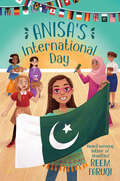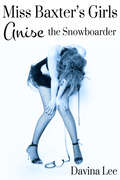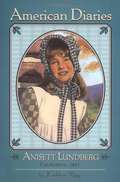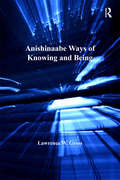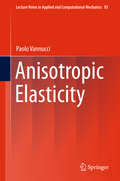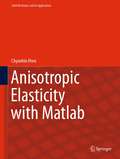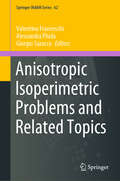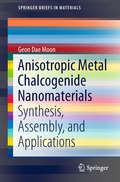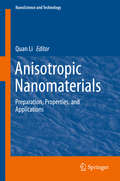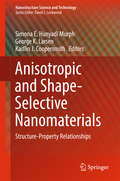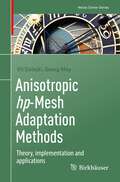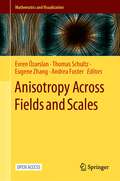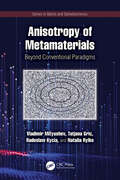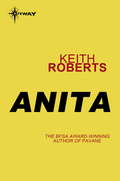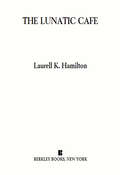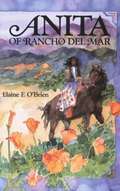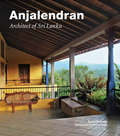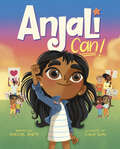- Table View
- List View
Anisa's International Day
by Reem FaruqiFrom the award-winning author of Unsettled, meet Anisa, the adorable Pakistani American heroine of this irresistible younger middle grade novel about a girl who introduces her class to the art of mehndi for International Day. Filled with fun black-and-white interior art, recipes, and activities in the back matter and perfect for fans of Meet Yasmin!"Genuine, sweet, and relatable. Anisa problems solves her way out of more than one sticky situation with sometimes unexpected—and joyful—results." —Maleeha Siddiqui, author of Barakah BeatsAnisa is super-excited about International Day and can’t wait to share her mother’s samosas with her class. But when someone else has the exact same idea, Anisa is crushed.Going to her aunt's dholki party gives her an idea for the perfect activity instead—mehndi! There’s only one problem: Anisa’s best friend doesn’t seem to like the idea. She doesn’t even seem to like Anisa anymore.Will Anisa ever get to enjoy International Day?
Anise the Snowboarder (Miss Baxter's Girls #2)
by Davina LeeHilary Baxter is a retired dominatrix who runs a boarding house for young women, and Anise has been there the longest. But how did she come to be employed as Miss Baxter’s sexy assistant? It wasn’t an easy road for either of them.The two mix like oil and water. Anise isn’t ready for Miss Baxter’s uptight attitude, and Miss Baxter certainly is not thrilled with Anise’s lackadaisical outlook on life. Then things come to a head, and Miss Baxter’s former profession takes center stage. Harsh words are spoken, apologies are made, and a new special therapy regime is agreed upon.
Anisett Lundberg: California, 1851 (American Diaries)
by Kathleen DueyCalifornia 1851: Anisett and her mother and younger brother struggle to make a meager living by providing meals for miners in rough gold camps. Anisett resents the harshness of her life and her mother's favoritism toward her brother, so, when she finds a small chunk of gold while fetching water from the creek, she keeps the discovery to herself.
Anishinaabe Songs for a New Millennium
by Marcie R. RendonPoem-songs summon the voices of Anishinaabe ancestors and sing to future generationsThe ancestors that walk with us, sing us our song. When we get quiet enough, we can hear them sing and make them audible to people today. In Anishinaabe Songs for a New Millennium, Marcie R. Rendon, a member of the White Earth Nation, summons those ancestors&’ songs, and so begins the dream singing for generations yet to come. &“The Anishinaabe heard stories in their dream songs,&” Ojibwe author Gerald Vizenor wrote, and like those stories once inscribed in pictographs on birch-bark scrolls, Rendon&’s poem-songs evoke the world still unfolding around us, reflecting our place in time for future generations. Through dream-songs and poem-songs responding to works of theater, choral music, and opera, Rendon brings memory to life, the senses to attention—to see the moonbeams blossoming on the windowsill, to feel the hold of the earth, to hear the echo of grandmother&’s breath, to lie on the bones of ancestors and feel the rhythms of silence running deep. Her singing, breaking the boundaries that time would impose, carries the Anishinaabe way of life and way of seeing forward in the world.
Anishinaabe Ways of Knowing and Being (Vitality of Indigenous Religions)
by Lawrence W. GrossVery few studies have examined the worldview of the Anishinaabeg from within the culture itself and none have explored the Anishinaabe worldview in relation to their efforts to maintain their culture in the present-day world. This book fills that gap. Focusing mainly on the Minnesota Anishinaabeg, Lawrence Gross explores how their worldview works to create a holistic way of living. However, as Gross also argues, the Anishinaabeg saw the end of their world early in the 20th century and experienced what he calls 'postapocalypse stress syndrome.' As such, the book further explores how the values engendered by the worldview of the Anishinaabeg are finding expression in the modern world as they seek to rebuild their society.
Anisotropic Elastic Plates
by Chyanbin HwuAs structural elements, anisotropic elastic plates find wide applications in modern technology. The plates here are considered to be subjected to not only inplane load but also transverse load. In other words, both plane and plate bending problems as well as the stretching-bending coupling problems are all explained in this book. In addition to the introduction of the theory of anisotropic elasticity, several important subjects have are discussed in this book such as interfaces, cracks, holes, inclusions, contact problems, piezoelectric materials, thermoelastic problems and boundary element analysis.
Anisotropic Elasticity (Lecture Notes in Applied and Computational Mechanics #85)
by Paolo VannucciThis book presents a modern and unconventional introduction to anisotropy. The first part presents a general description of Anisotropic Elasticity theories while the second part focuses on the polar formalism: the theoretical bases and results are completely developed along with applications to design problems of laminated anisotropic structures. The book is based on lectures on anisotropy which have been held at Ecole Polytechnique in Paris.
Anisotropic Elasticity with Matlab (Solid Mechanics and Its Applications #267)
by Chyanbin HwuThis book provides the theory of anisotropic elasticity with the computer program for analytical solutions as well as boundary element methods. It covers the elastic analysis of two-dimensional, plate bending, coupled stretching-bending, and three-dimensional deformations, and is extended to the piezoelectric, piezomagnetic, magnetic-electro-elastic, viscoelastic materials, and the ones under thermal environment. The analytical solutions include the solutions for infinite space, half-space, bi-materials, wedges, interface corners, holes, cracks, inclusions, and contact problems. The boundary element solutions include BEMs for two-dimensional anisotropic elastic, piezoelectric, magnetic-electro-elastic, viscoelastic analyses, and their associated dynamic analyses, as well as coupled stretching-bending analysis, contact analysis, and three-dimensional analysis. This book also provides source codes and examples for all the presenting analytical solutions and boundary element methods. The program is named as AEPH (Anisotropic Elastic Plates – Hwu), which contains 204 MATLAB functions.
Anisotropic Isoperimetric Problems and Related Topics (Springer INdAM Series #62)
by Valentina Franceschi Alessandra Pluda Giorgio SaraccoThis book contains contributions from speakers at the "Anisotropic Isoperimetric Problems & Related Topics" conference in Rome, held from Sep 5 to 9, 2022. The classic isoperimetric problem has fascinated mathematicians of all eras, starting from the ancient Greeks, due to its simple statement: what are the sets of a given volume with minimal perimeter? The problem is mathematically well understood, and it plays a crucial role in explaining physical phenomena such as soap bubble shapes. Variations of the problem, including weighted counterparts with density dependencies, representing inhomogeneity and anisotropy of the medium, broaden its applicability, even in non-Euclidean environments, and they allow for descriptions, e.g., of crystal shapes. At large, the perimeter's physical interpretation is that of an attractive force; hence, it also appears in describing systems of particles where a balance between attractive and repulsive forces appears. A prominent example is that of Gamow's liquid drop model for atomic nuclei, where protons are subject to the strong nuclear attractive force (represented by the perimeter) and the electromagnetic repulsive force (represented by a nonlocal term). Such a model has been shown to be sound, as it explains the basic characteristics of the nuclei, and it successfully predicts nuclear fission for nuclei with a large atomic number. Similar energy functionals model various physical and biological systems, showcasing the competition between short-range interfacial and long-range nonlocal terms, leading to pattern formation. The authors mention, e.g., the Ohta–Kawasaki model for microphase separation of diblock copolymers and the Yukawa potential for colloidal systems. Despite diverse systems, the emergence of microphases follows similar patterns, although rigorously proving this phenomenon remains a challenge. The book collects several contributions within these topics, shedding light on the current state of the art.
Anisotropic Metal Chalcogenide Nanomaterials: Synthesis, Assembly, And Applications (SpringerBriefs in Materials)
by Geon Dae MoonThis book explores the recent advances in designing and synthesizing one- and two-dimensional metal chalcogenide nanostructures, along with their practical applications, helping readers understand what has happened, and what is currently happening in the field of nanotechnology. It also includes a comprehensive table showing 1D and 2D nanostructured metal chalcogenides, which presents the recent developments from a synthetic point of view. Further, it describes the wide applicability of anisotropic metal chalcogenides, such as in electronics, energy storage and conversion, and sensors. Lastly it discusses the current understanding of the thermodynamic and kinetic aspects associated with the forming mechanisms of anisotropic metal chalcogenide nanostructures. This book is a valuable reference resource for practitioners and researchers, enabling them to obtain a quick overview of anisotropic metal chalcogenide nanomaterials through synthetic approaches and related applications. Presenting representative applications of anisotropic metal chalcogenide nanomaterials that are important in the industrial sector, it is also of interest to academics and industry specialists.
Anisotropic Nanomaterials: Preparation, Properties, and Applications (NanoScience and Technology)
by Quan LiIn this book anisotropic one-dimensional and two-dimensional nanoscale building blocks and their assembly into fascinating and qualitatively new functional structures embracing both hard and soft components are explained. Contributions from leading experts regarding important aspects like synthesis, assembly, properties and applications of the above materials are compiled into a reference book. The anisotropy, i. e. the direction-dependent physical properties, of materials is fascinating and elegant and has sparked the quest for anisotropic materials with useful properties. With such a curiosity, material scientists have ventured into the realm of nanometer length scale and have explored the anisotropic nanoscale building blocks such as metallic and nonmetallic particles as well as organic molecular aggregates. It turns out that the anisotropic nanoscale building blocks, in addition to direction-dependent properties, exhibit dimension and morphology dependence of physical properties. Moreover, ordered arrays of anisotropic nanoscale building blocks furnish novel properties into the resulting system which would be entirely different from the properties of individual ones. Undoubtedly, these promising properties have qualified them as enabling building blocks of 21st century materials science, nanoscience and nanotechnology. Readers will find this book professionally valuable and intellectually stimulating in the rapidly emerging area of anisotropic nanomaterials. Quan Li, Ph. D. , is Director of the Organic Synthesis and Advanced Materials Laboratory at the Liquid Crystal Institute of Kent State University, where he is also Adjunct Professor in the Chemical Physics Interdisciplinary Program. He has directed research projects funded by US Air Force Research Laboratory (AFRL), US Air Force Office of Scientific Research (AFSOR), US Army Research Office (ARO), US Department of Defense Multidisciplinary University Research Initiative (DoD MURI), US National Science Foundation (NSF), US Department of Energy (DOE), US National Aeronautics and Space Administration (NASA), Ohio Third Frontier, and Samsung Electronics, among others.
Anisotropic and Shape-Selective Nanomaterials: Structure-Property Relationships (Nanostructure Science and Technology)
by Simona E. Hunyadi Murph George K. Larsen Kaitlin J. CoopersmithThis book reviews recent advances in the synthesis, characterization, and physico-chemical properties of anisotropic nanomaterials. It highlights various emerging applications of nanomaterials, including sensing and imaging, (bio)medical applications, environmental protection, plasmonics, catalysis, and energy. It provides an excellent and comprehensive overview of the effect that morphology and nanometric dimension has on the physico-chemical properties of various materials and how this leads to novel applications.
Anisotropic hp-Mesh Adaptation Methods: Theory, implementation and applications (Nečas Center Series)
by Vít Dolejší Georg MayMesh adaptation methods can have a profound impact on the numerical solution of partial differential equations. If devised and implemented properly, adaptation significantly reduces the size of the algebraic systems resulting from the discretization, while ensuring that applicable error tolerances are met. In this monograph, drawing from many years of experience, the authors give a comprehensive presentation of metric-based anisotropic hp-mesh adaptation methods.A large part of this monograph is devoted to the derivation of computable interpolation error estimates on simplicial meshes, which take into account the geometry of mesh elements as well as the anisotropic features of the interpolated function. These estimates are then used for the optimization of corresponding finite element spaces in a variety of settings. Both steady and time dependent problems are treated, as well as goal-oriented adaptation. Practical aspects of implementation are also explored, including several algorithms. Many numerical experiments using the discontinuous Galerkin method are presented to illustrate the performance of the adaptive techniques.This monograph is intended for scientists and researchers, including doctoral and master-level students. Portions of the text can also be used as study material for advanced university lectures concerning a posteriori error analysis and mesh adaptation.
Anisotropy Across Fields and Scales (Mathematics and Visualization)
by Thomas Schultz Andrea Fuster Evren Özarslan Eugene ZhangThis open access book focuses on processing, modeling, and visualization of anisotropy information, which are often addressed by employing sophisticated mathematical constructs such as tensors and other higher-order descriptors. It also discusses adaptations of such constructs to problems encountered in seemingly dissimilar areas of medical imaging, physical sciences, and engineering. Featuring original research contributions as well as insightful reviews for scientists interested in handling anisotropy information, it covers topics such as pertinent geometric and algebraic properties of tensors and tensor fields, challenges faced in processing and visualizing different types of data, statistical techniques for data processing, and specific applications like mapping white-matter fiber tracts in the brain.The book helps readers grasp the current challenges in the field and provides information on the techniques devised to address them. Further, it facilitates the transfer of knowledge between different disciplines in order to advance the research frontiers in these areas.This multidisciplinary book presents, in part, the outcomes of the seventh in a series of Dagstuhl seminars devoted to visualization and processing of tensor fields and higher-order descriptors, which was held in Dagstuhl, Germany, on October 28–November 2, 2018.
Anisotropy of Metamaterials: Beyond Conventional Paradigms (Series in Optics and Optoelectronics)
by Vladimir Mityushev Natalia Rylko Tatjana Gric Radoslaw KyciaAnisotropy of Metamaterials: Beyond Conventional Paradigms provides a comprehensive introduction to the mathematical modeling of metamaterials based on the macroscopic complex-valued permittivity tensor of dispersed random composites. Key topics include physical and mathematical theory, computer simulations, constructive homogenization, classification of dispersed random composites and their applications in cancer recognition. Image processing and machine learning algorithms are used. The book also discusses the precision of various effective medium approximations, including Bruggeman and Maxwell-Garnett formulas. New analytical, approximate and exact formulas and bounds for the macroscopic permittivity and piezoelectric constants of composites are derived. This book is a valuable tool for academics and professionals in photonics, presenting sustainable materials for sensing, health diagnostics and cancer detection methodologies.Key features: Offers key insights into the current trends and techniques in the study of the macroscopic properties of metamaterials, aiming at stimulating new avenues of research Presents examples of image analysis, the primary tool for non-destructive metamaterials analysis Discusses the applications of Machine Learning to image processing, illustrated using specific code in Python programming language
Anita
by Keith RobertsMost people think witches are old and ugly - but ANITA isn't.ANITA doesn't cackle and hiss as she works dark curses, either. Oh, she casts witch's spells and incantations, but not the usual kind.ANITA's main interest is boys, just like any other girl her age. And she doesn't really need things like love potions - not with her face and figure.But ANITA is a witch, and she's young and a little reckless. Which means she sometimes makes mistakes (usually with boys), and when she does... all Hell might break loose....
Anita
by Keith RobertsMost people think witches are old and ugly - but ANITA isn't. ANITA doesn't cackle and hiss as she works dark curses, either. Oh, she casts witch's spells and incantations, but not the usual kind. ANITA's main interest is boys, just like any other girl her age. And she doesn't really need things like love potions - not with her face and figure. But ANITA is a witch, and she's young and a little reckless. Which means she sometimes makes mistakes (usually with boys), and when she does... all Hell might break loose....
Anita Blake, Vampire Hunter Collection 1-5
by Laurell K. HamiltonIncludes the first five books of the popular paranormal series.
Anita Brenner: A Mind of Her Own
by Susannah Joel GluskerJournalist, historian, anthropologist, art critic, and creative writer, Anita Brenner was one of Mexico's most discerning interpreters. In this book, her daughter, Susannah Glusker, traces Brenner's intellectual growth and achievements from the 1920s through the 1940s. This intellectual biography brings to light a complex, fascinating woman who bridged many worlds--the United States and Mexico, art and politics, professional work and family life. Journalist, historian, anthropologist, art critic, and creative writer, Anita Brenner was one of Mexico's most discerning interpreters. Born to a Jewish immigrant family in Mexico a few years before the Revolution of 1910, she matured into an independent liberal who defended Mexico, workers, and all those who were treated unfairly, whatever their origin or nationality. In this book, her daughter, Susannah Glusker, traces Brenner's intellectual growth and achievements from the 1920s through the 1940s. Drawing on Brenner's unpublished journals and autobiographical novel, as well as on her published writing, Glusker describes the origin and impact of Brenner's three major books, Idols Behind Altars, Your Mexican Holiday, and The Wind That Swept Mexico. Along the way, Glusker traces Brenner's support of many liberal causes, including her championship of Mexico as a haven for Jewish immigrants in the early 1920s. This intellectual biography brings to light a complex, fascinating woman who bridged many worlds--the United States and Mexico, art and politics, professional work and family life.
Anita and Me
by Meera SyalThis is the story of Meena the nine-year-old, daughter of the only Punjabi family in the mining village of Tollington. A vision of British childhood in the 1960s, caught between two cultures, each on the edge of enormous change is portrayed here.
Anita de Monte Laughs Last: Reese's Book Club Pick (A Novel)
by Xochitl GonzalezREESE'S BOOK CLUB PICK • New York Times bestselling author Xochitl Gonzalez delivers a mesmerizing novel about a first-generation Ivy League student who uncovers the genius work of a female artist decades after her suspicious deathA Best Book of 2024: Kirkus, TIME, NPR, Goodreads, Electric Lit and more!“Anita de Monte Laughs Last is a cry for justice. Writing with urgency and rage, Gonzalez speaks up for those who have been othered and deemed unworthy, robbed of their legacy." ―The Washington Post "Anita De Monte Laughs Last by Xochitl Gonzalez asks some big questions, like who in art or history is remembered, who is left behind or erased and WHY. I have goosebumps just talking about this story." ―Reese Witherspoon 1985. Anita de Monte, a rising star in the art world, is found dead in New York City; her tragic death is the talk of the town. Until it isn’t. By 1998 Anita’s name has been all but forgotten—certainly by the time Raquel, a third-year art history student is preparing her final thesis. On College Hill, surrounded by privileged students whose futures are already paved out for them, Raquel feels like an outsider. Students of color, like her, are the minority there, and the pressure to work twice as hard for the same opportunities is no secret. But when Raquel becomes romantically involved with a well-connected older art student, she finds herself unexpectedly rising up the social ranks. As she attempts to straddle both worlds, she stumbles upon Anita’s story, raising questions about the dynamics of her own relationship, which eerily mirrors that of the forgotten artist.Moving back and forth through time and told from the perspectives of both women, Anita de Monte Laughs Last is a propulsive, witty examination of power, love, and art, daring to ask who gets to be remembered and who is left behind in the rarefied world of the elite.
Anita of Rancho Del Mar
by Elaine F. O'BrienDepicts life on a Spanish land-grant ranch in California in the 1830s through the adventures of young Anita and the Lorenzana family.
Anjalendran
by David Robson Waruna GomisDuring the past 25 years of civil war in Sri Lanka, Anjalendran has stayed on, creating architecture that has attracted interest across the entire Indian subcontinent.In Anjalendran, David Robson explores this unique man and his uncommon vision. Anjalendran's buildings have a simple directness and although totally modern in spirit, they acknowledge the rich traditions of Sri Lanka. Whether working with ample budgets or at rock bottom cost (like his SOS Children's Village orphanages), his work focuses not only on creative buildings, but-:a la Frank Lloyd Wright-:also their landscaping, furniture and decoration.Just as interesting as the architecture is the process by which Anjalendran works-:from home, never employing more than four student assistants, with no office, no secretary, no car and no cell phone. He operates without a bank account and has never signed a contract with either a client or a builder. With stunning color photographs, plan details and behind-the-scenes insights, Anjalendran sheds light on the works of this exceptional man.
Anjalendran
by David Robson Waruna GomisDuring the past 25 years of civil war in Sri Lanka, Anjalendran has stayed on, creating architecture that has attracted interest across the entire Indian subcontinent.In Anjalendran, David Robson explores this unique man and his uncommon vision. Anjalendran's buildings have a simple directness and although totally modern in spirit, they acknowledge the rich traditions of Sri Lanka. Whether working with ample budgets or at rock bottom cost (like his SOS Children's Village orphanages), his work focuses not only on creative buildings, but-:a la Frank Lloyd Wright-:also their landscaping, furniture and decoration.Just as interesting as the architecture is the process by which Anjalendran works-:from home, never employing more than four student assistants, with no office, no secretary, no car and no cell phone. He operates without a bank account and has never signed a contract with either a client or a builder. With stunning color photographs, plan details and behind-the-scenes insights, Anjalendran sheds light on the works of this exceptional man.
Anjali Can! (Always Anjali)
by Sheetal ShethAnjali is back and ready to prove there&’s nothing she can&’t do, in this third book in the Always Anjali series! When a beloved community center is threatened with shutting down, Anjali must quickly find a way to save the space or risk losing it.The local community center is a second home to Anjali. It's where she met her best friends; it's her favorite spot for game and movie nights; and it's where she learned to play tabla.Anjali has so many happy memories there, but now the community center is closing! Unwilling to let the center shut down for good, Anjali is determined to keep the place open. Some people may say there's nothing she can do, but Anjali knows better--she can and must take action! There is no stopping her.From actor, author, and activist Sheetal Sheth comes the third book in the Anjali series and a reminder of the power of one and to always fight for what you believe in.
